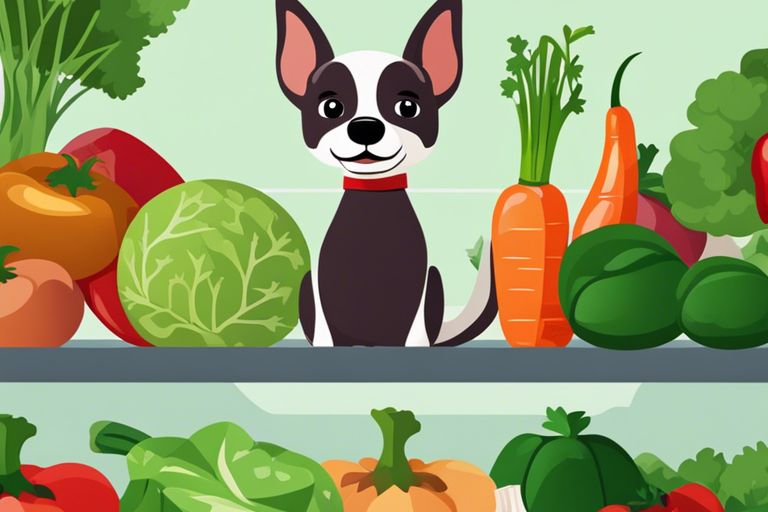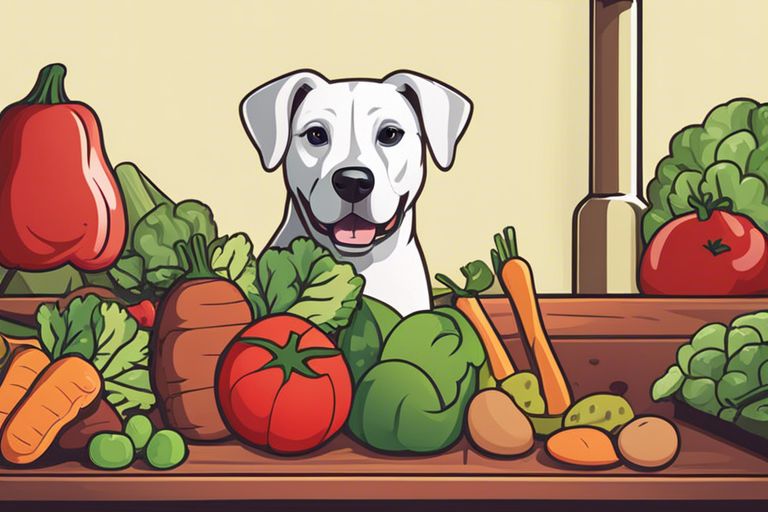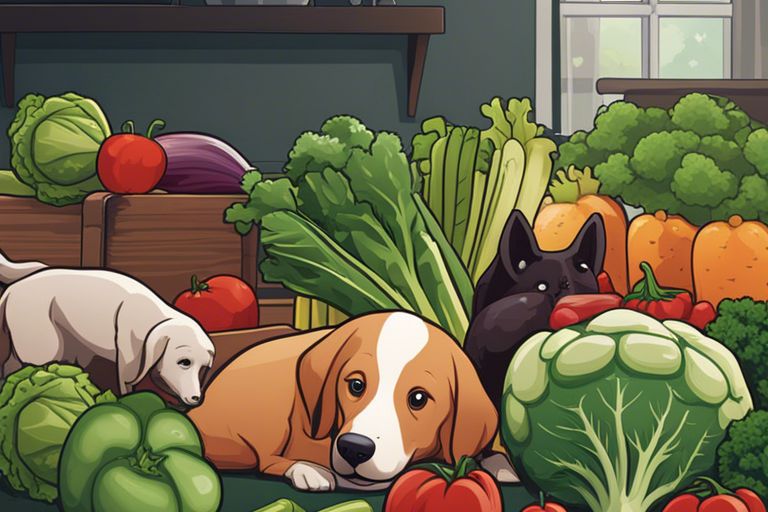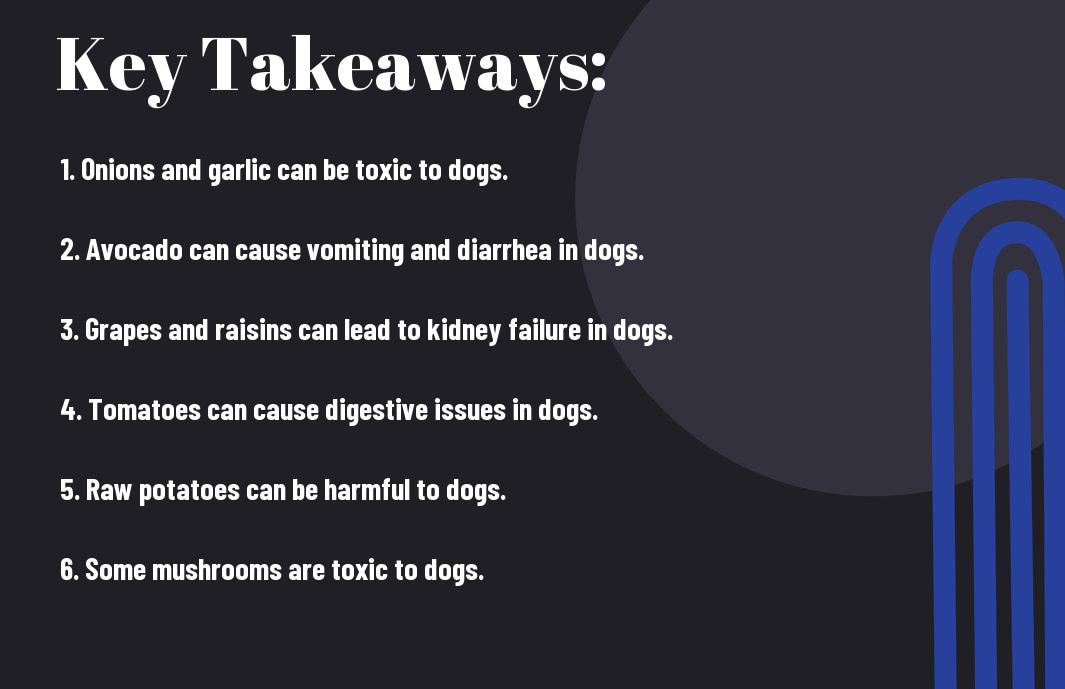Grapes, although a fruit, are a prime example of foods that must be kept far away from our canine companions. As we explore the world of vegetables safe for dogs, it is equally important to understand which ones can be harmful to our furry friends. Join us on this enlightening journey to uncover the vegetables that should never find their way into a dog’s food bowl.
Key Takeaways:
- Onion and garlic: These vegetables contain compounds that can damage a dog’s red blood cells, leading to anemia.
- Grapes and raisins: Even in small quantities, these fruits can cause kidney failure in dogs.
- Avocado: The persin compound in avocados can be toxic to dogs and cause vomiting and diarrhea.
In the complex web of nature, some vegetables can hold hidden dangers for our canine companions. It is crucial for dog owners to be aware of these potentially harmful vegetables to ensure the well-being and health of their furry friends.
Toxic Vegetables
Onions and Garlic
Toxic to dogs, onions and garlic belong to the allium family and contain compounds that can damage your pet’s red blood cells, leading to anemia. Even in small amounts, these vegetables can be harmful, so it’s best to avoid feeding them to your furry friend.
Chives and Leeks
Vegetables such as chives and leeks, also part of the allium family, can pose a similar risk to dogs as onions and garlic. These vegetables contain the same toxic compounds that can cause damage to your pet’s red blood cells, so it’s crucial to keep them away from your dog’s diet.
It’s important to note that the toxic effects of allium vegetables may not be immediately apparent, as symptoms can take a few days to show. If you suspect that your dog has ingested any of these vegetables, be sure to consult your veterinarian for guidance.
Mushrooms
One of the most critical things to remember when it comes to mushrooms is that while some varieties are safe for your dog to consume, there are many poisonous species that can be extremely harmful. To ensure your pet’s safety, it’s best to avoid feeding them any type of mushroom unless you are certain it is safe.
A misidentification of a toxic mushroom can have severe consequences for your dog, potentially leading to symptoms such as vomiting, diarrhea, abdominal pain, seizures, and even organ failure. In terms of mushrooms, it’s always best to err on the side of caution and keep them out of your dog’s reach.
Vegetables Causing Gastrointestinal Issues
Some vegetables can be harmful to dogs, causing gastrointestinal issues that may lead to discomfort and health problems. It’s crucial to be aware of which vegetables are not suitable for your furry friend to prevent any potential issues.
Beans and Legumes
An important group of vegetables to be cautious of when it comes to your canine companion is beans and legumes. While these may seem like healthy options, certain varieties such as kidney beans and black beans can be difficult for dogs to digest. Consuming these can lead to bloating, gas, and even more severe conditions like pancreatitis.
Cruciferous Vegetables
Beans aside, cruciferous vegetables, such as broccoli, cauliflower, and Brussels sprouts, are another group that can cause gastrointestinal troubles for dogs. These veggies contain compounds that can be hard for your pup’s digestive system to break down, potentially leading to discomfort and digestive issues.
Cruciferous vegetables are also known to cause gas and bloating in dogs, which can be quite uncomfortable for our furry friends. It’s best to avoid feeding these vegetables to your dog to prevent any unnecessary discomfort.
Corn and Peas
An additional pair of vegetables that can pose problems for dogs are corn and peas. While these may seem harmless, they can be difficult for dogs to digest, leading to gastrointestinal issues like diarrhea or stomach discomfort. It’s best to limit your dog’s consumption of these vegetables to avoid any potential problems.
Legumes such as peas and beans can be challenging for dogs to digest, potentially causing gastrointestinal issues. It’s always wise to monitor your dog’s reaction to these vegetables and consult with your vet if you have any concerns about their digestive health.
Vegetables High in Oxalates
All vegetables contain different levels of oxalates, which are naturally occurring compounds that can interfere with calcium absorption in dogs. However, some vegetables are particularly high in oxalates and should be avoided to prevent any potential health issues.
Spinach and Beet Greens
Oxalates found in spinach and beet greens can pose a risk to your dog’s health if consumed in large quantities. These vegetables are known to have high levels of oxalic acid, which can contribute to the formation of kidney stones in dogs.
While small amounts of spinach or beet greens may not harm your dog, it’s best to avoid feeding them these vegetables regularly to reduce the risk of oxalate toxicity.
Rhubarb and Swiss Chard
For dogs, rhubarb and Swiss chard are also high in oxalates, which can be harmful if ingested in large amounts. These vegetables contain oxalic acid, which can bind with calcium and prevent its absorption, leading to potential issues with calcium metabolism in dogs.
For instance, if your dog consumes a significant amount of rhubarb or Swiss chard, they may experience symptoms such as drooling, vomiting, weakness, and even kidney failure. It’s crucial to keep these vegetables out of your dog’s reach to prevent any accidental ingestion.
Vegetables Causing Allergic Reactions
Despite the numerous health benefits of vegetables for dogs, some can trigger allergic reactions. It’s crucial to be aware of which vegetables can cause issues for our furry friends. For a comprehensive list of fruits and vegetables toxic to dogs, you can refer to 12 fruits and vegetables toxic to dogs.
Tomatoes and Peppers
An allergic reaction in dogs can be triggered by tomatoes and peppers. While ripe red tomatoes are generally considered safe in small amounts, green tomatoes and tomato plants contain solanine, which can be harmful to dogs. Peppers, specifically hot varieties like jalapeños and chili peppers, can cause stomach upset and digestive issues in dogs. It’s advisable to avoid feeding these vegetables to your canine companion to prevent any potential allergic reactions.
Cucumbers and Squash
An allergic reaction in dogs may also occur when they consume cucumbers and squash. While these vegetables are not inherently toxic to dogs, some canines may have sensitivities that manifest as allergic reactions. It’s crucial to introduce cucumbers and squash gradually into your dog’s diet and monitor for any adverse effects. If you notice any signs of allergies such as itching, swelling, or gastrointestinal distress, it’s best to consult your veterinarian for guidance.
Allergic reactions in dogs to cucumbers and squash are relatively rare, but it’s crucial to pay attention to your pet’s response when introducing new vegetables into their diet. Monitoring for any signs of allergies and seeking prompt veterinary care if needed can help ensure your dog stays healthy and happy.
Vegetables Interfering with Nutrient Absorption
Broccoli and Cauliflower
For those looking to provide their canine companions with a balanced diet, it’s crucial to be aware that certain vegetables can interfere with nutrient absorption. Broccoli and cauliflower, while generally considered safe for dogs in small amounts, contain compounds that can hinder the absorption of iodine in the thyroid gland.
Kale and Collard Greens
Any conscientious pet owner should take note that kale and collard greens, often hailed for their nutritional value in human diets, can also pose a risk to dogs. These leafy greens are packed with calcium oxalate, which can impede the absorption of calcium in the body of our furry friends.
With kale and collard greens, moderation is key. While they do offer a range of vitamins and minerals beneficial to dogs, excessive consumption can lead to potential health issues due to their interference with calcium absorption.
Nutrient absorption plays a vital role in maintaining the overall health and well-being of our pets. By being mindful of the vegetables we feed our dogs and their potential impacts on nutrient absorption, we can ensure that they receive a well-balanced diet that supports their optimal health.
Vegetables That Can Cause Obstruction
Once again, it is important to be cautious when feeding your dog certain vegetables as they can potentially cause obstruction in their digestive system. This can lead to serious health issues and may require veterinary intervention.
Raw Potatoes
One vegetable that can cause obstruction in dogs is raw potatoes. Raw potatoes contain solanine, a compound that is toxic to dogs and can cause gastrointestinal issues such as blockages. It is crucial to ensure that any potatoes fed to your dog are cooked thoroughly to eliminate this risk.
Celery and Carrots
The consumption of celery and carrots by dogs can also lead to obstruction in their digestive system. While these vegetables are generally considered safe for dogs in small amounts, the stringy nature of celery and the fibrous content of carrots can pose a risk of blockage, especially if consumed in large quantities.
That said, if you choose to feed your dog celery or carrots, it is important to cut them into small, manageable pieces to reduce the risk of obstruction. Additionally, always monitor your dog while they are eating these vegetables to ensure they are chewing them thoroughly.
Summing up
The world of vegetables can be a colorful and nutritious one for dogs to explore. However, there are certain vegetables that can be harmful and even toxic to our canine companions. It’s crucial for dog owners to be aware of what vegetables dogs should not eat, such as onions, garlic, and avocados, to ensure the health and well-being of their furry friends. For a comprehensive list of foods that are dangerous for dogs, visit Toxic and Dangerous Foods Your Dog Should Never Eat.
FAQ
Q: What vegetables can dogs not eat?
A: Dogs cannot eat onions, garlic, chives, or leeks as they can cause toxicity in dogs.
Q: Why are onions, garlic, chives, and leeks harmful to dogs?
A: These vegetables contain compounds that can damage a dog’s red blood cells, leading to anemia and other health issues.
Q: Can dogs eat avocados?
A: Avocados are not recommended for dogs as they contain a substance called persin, which can be toxic to them in large quantities.
Q: Are tomatoes safe for dogs to consume?
A: While ripe tomatoes in small amounts are generally safe for dogs, the green parts and stems of tomatoes contain solanine, which is toxic to dogs.
Q: Can dogs eat raw potatoes?
A: Raw potatoes, as well as potato plants and their eyes, contain solanine and other toxic compounds that can be harmful to dogs when consumed in large quantities.




